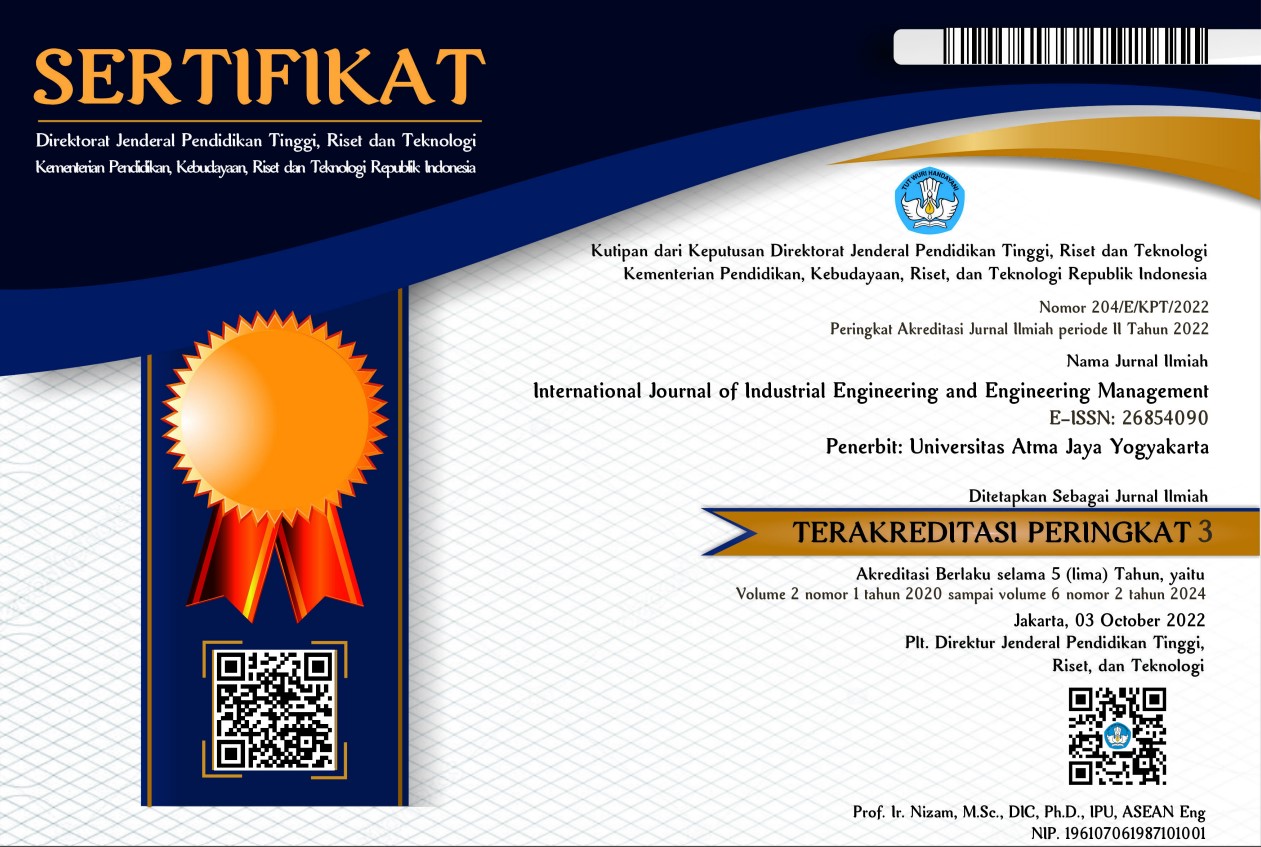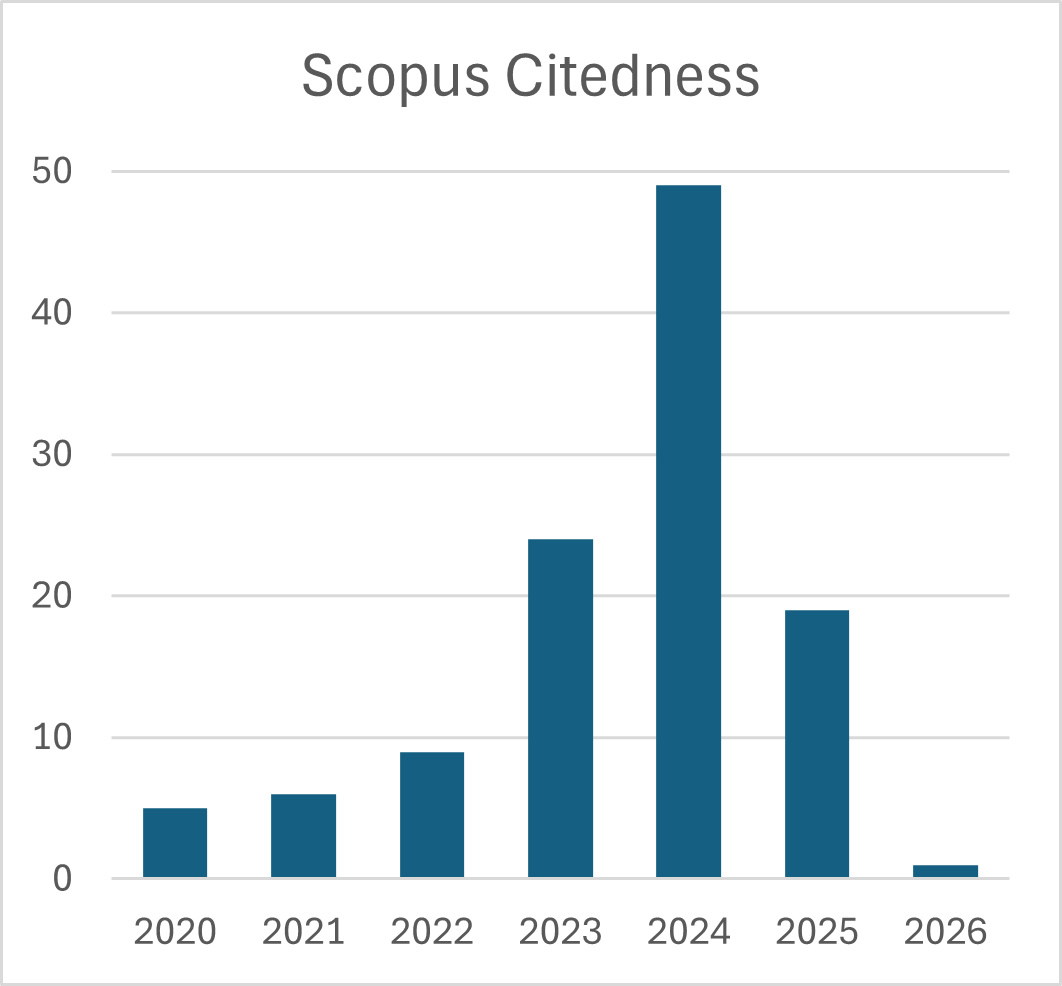Utilizing Online Reviews for Human Resource Development in the Retail Industry Using Aspect-based Sentiment Analysis
DOI:
https://doi.org/10.24002/ijieem.v6i2.9092Keywords:
aspect-based sentiment analysis, human resource, Large language model translation, online review, retail industryAbstract
The growth in the retail industry means that the retail industry must have a competitive advantage to compete. One source of competitive advantage is customer experience. One factor that has a positive influence on customer experience is the service provided by frontline employees. Nowadays, customers can easily share their experiences and information in online reviews. Therefore, a good understanding of online reviews is necessary to maintain customer satisfaction. This paper proposes a new method for obtaining information from online reviews available on online review platforms such as Google Maps. Reviews on the website will be scraped and translated into English using the large language model (LLM). The translated reviews will be translated to obtain aspects, sentiments, and opinions using an aspect-based sentiment analysis (ABSA) model that has been previously drilled using a dataset in English. The findings are visualized into Pareto diagrams and word cloud to identify aspects related to human resources that most influence the negative or positive ratings given by customers through online reviews.
References
Agrawal, S., Zhou, C., Lewis, M., Zettlemoyer, L., & Ghazvininejad, M. (2023). In-context examples selection for machine translation. Findings of the Association for Computational Linguistics: ACL 2023, 8857–8873.
Aguilar-Moreno, J. A., Palos-Sanchez, P. R., & Pozo-Barajas, R. (2024). Sentiment analysis to support business decision-making. A bibliometric study. AIMS Mathematics, 9(2), 4337 – 4375.
Alsaadi, E. M. T. A., Khlebus, S. F., & Alabaichi, A. (2022). Identification of human resource analytics using machine learning algorithms. TELKOMNIKA (Telecommunication Computing Electronics and Control), 20(5), 1004 – 1015.
Askalidis, G., & Malthouse, E. C. (2016). The value of online customer reviews. Paper presented at the 10th ACM Conference on Recommender Systems, United States.
Barreto, F., Moharkar, L., Shirodkar, M., Sarode, V., Gonsalves, S., & Johns, A. (2023). Generative artificial intelligence: Opportunities and challenges of large language models. International Conference on Intelligent Computing and Networking, 545-553.
Bauer, T., Erdogan, B., Caughlin, D. E., & Truxillo, D. M. (2023). Human resource management: People, data, and analytics (2nd ed.). California, US: Sage Publications, Inc.
Birjali, M., Kasri, M., & Beni-Hssane, A. (2021). A comprehensive survey on sentiment analysis: Approaches, challenges, and trends. Knowledge-Based Systems, 226, Article 107134.
Bonilla-Chaves, E. F., & Palos-Sánchez, P. R. (2023). Exploring the evolution of human resource analytics: A bibliometric study. Behavioral Sciences, 13, Article 244.
Cambria, E., Das, D., Bandyopadhyay, S., & Feraco, A. (Eds.). (2017). A practical guide to sentiment analysis (Vol. 5). London: Springer Publishing Company.
Caughlin, D. E. (2024). R for HR: An introduction to human resource analytics using R. Retrieved from https://rforhr.com/
Chamid, A. A., Widowati, & Kusumaningrum, R. (2022). Graph-based semi-supervised deep learning for Indonesian aspect-based sentiment analysis. Big Data and Cognitive Computing, 7(1), Article 5.
Dehler-Holland, J., Okoh, M., & Keles, D. (2022). Assessing technology legitimacy with topic models and sentiment analysis – The case of wind power in Germany. Technological Forecasting and Social Change, 175, Article 121354.
Diamantidis, A. D., & Chatzoglou, P. D. (2014). Employee post‐training behaviour and performance: evaluating the results of the training process. International Journal of Training and Development, 18(3), 149–170.
Duan, W., Gu, B., & Whinston, A. B. (2008). Do online reviews matter? — An empirical investigation of panel data. Decision Support Systems, 45(4), 1007–1016.
Essebbar, A., Kane, B., Guinaudeau, O., Chiesa, V., Quénel, I., & Chau, S. (2021). Aspect-based sentiment analysis using French pre-trained models. Paper presented at the 13th International Conference on Agents and Artificial Intelligence, online.
Galperin, B. L., & Lituchy, T. R. (2014). Human resource development in service firms across cultures. Human Resource Development Review, 13(3), 336–368.
Ghlichlee, B., & Bayat, F. (2021). Frontline employees’ engagement and business performance: the mediating role of customer-oriented behaviors. Management Research Review, 44(2), 290–317.
Grönroos, C. (1990). Service management and marketing: Managing the moments of truth in service competition. United States: Lexington Books.
Harrison, J. (2022). R selenium: R bindings for “Selenium WebDriver” (1.7.9 version). Retrieved from https://cran.r-project.org/web/packages/RSelenium/RSelenium.pdf
Hassani, H., Beneki, C., Unger, S., Mazinani, M. T., & Yeganegi, M. R. (2020). Text mining in big data analytics. Big Data and Cognitive Computing, 4(1), Article 1.
He, Z., Liang, T., Jiao, W., Zhang, Z., Yang, Y., Wang, R., Tu, Z., Shi, S., & Wang, X. (2024). Exploring human-like translation strategy with large language models. Transactions of the Association for Computational Linguistics, 12, 229–246.
Heo, S.J., & Bae, H.-J. (2020). Analysis of the consumption pattern of delivery food according to food-related lifestyle. Journal of Nutrition and Health, 53(5), 547-561.
Hota, H. S., Sharma, D. K., & Verma, N. (2021). Lexicon-based sentiment analysis using Twitter data. In U. Kose, D. Gupta, V.H.C.de Albuquerque, & A. Khanna (Eds.), Data science for COVID-19 (pp. 275–295). United States: Academia Press.
Ireland, R., & Liu, A. (2018). Application of data analytics for product design: Sentiment analysis of online product reviews. CIRP Journal of Manufacturing Science and Technology, 23, 128–144.
Jian, S. Y. B., Nayak, T., Majumder, N., & Poria, S. (2021). Aspect sentiment triplet extraction using reinforcement learning. Paper presented at the 30th ACM International Conference on Information and Knowledge Management, Australia.
Jiao, W., Wang, W., Huang, J., Wang, X., Shi, S., & Tu, Z. (2023). Is ChatGPT a good translator? Yes with GPT-4 as the engine. Retrieved from https://arxiv.org/abs/2301.08745
Joshi, A., Giannotto, A., Arora, I., & Raman, S. (2019). Aspect and opinion extraction for Amazon reviews. Retrieved from https://achyutjoshi.github.io/aspect_extraction/overview
Judd, V. C. (2003). Achieving a customer orientation using “people‐power,” the “5th P”. European Journal of Marketing, 37(10), 1301–1313.
Kim, Y.J., & Kim, H.S. (2022). The impact of hotel customer experience on customer satisfaction through online reviews. Sustainability, 14(2), Article 848.
Lee, K., & Yu, C. (2018). Assessment of airport service quality: A complementary approach to measure perceived service quality based on Google reviews. Journal of Air Transport Management, 71, 28–44.
Li, Y., Dong, Y., Wang, Y., & Zhang, N. (2023). Product design opportunity identification through mining the critical minority of customer online reviews. Electronic Commerce Research.
Liao, S.H., Chu, P.H., & Hsiao, P.Y. (2012). Data mining techniques and applications – A decade review from 2000 to 2011. Expert Systems with Applications, 39(12), 11303–11311.
Marder, B., Angell, R., & Boyd, E. (2023). How and why (imagined) online reviews impact frontline retail encounters. Journal of Retailing, 99(2), 265–279.
Muthukadan, B. (2024). Selenium with Python (4.22.0 version). Retrieved from https://selenium-python.readthedocs.io/installation.html#introduction
Nayoan, R. A. N., Hidayatullah, A. F., & Fudholi, D. H. (2021). Convolutional neural networks for Indonesian aspect-based sentiment analysis tourism review. Paper presented at the 9th International Conference on Information and Communication Technology (ICoICT), Yogyakarta, Indonesia.
Oberlo. (2024). Global retail industry growth rate (2021–2027). Retrieved from https://www.oberlo.com/statistics/retail-industry-growth-rate
Papademetriou, C., Anastasiadou, S., & Papalexandris, S. (2023). The effect of sustainable human resource management practices on customer satisfaction, service quality, and institutional performance in hotel businesses. Sustainability, 15(10), Article 8251.
Pei, X.L., Guo, J.N., Wu, T.J., Zhou, W.X., & Yeh, S.P. (2020). Does the effect of customer experience on customer satisfaction create a sustainable competitive advantage? A comparative study of different shopping situations. Sustainability, 12(18), Article 7436.
Pijpers, P. B. M. J., Voskuijl, M., & Beeres, R. (2023). Towards a data-driven military: A multi-disciplinary perspective. Amsterdam: Leiden University Press.
Pontiki, M., Galanis, D., Pavlopoulos, J., Papageorgiou, H., Androutsopoulos, I., & Manandhar, S. (2014). SemEval-2014 Task 4: Aspect-based sentiment analysis. Paper presented at the 8th International Workshop on Semantic Evaluation (SemEval 2014), Ireland.
Raguvir, S., & Babu, S. (2020). Enhance employee productivity using talent analytics and visualization. Paper presented at 2020 International Conference on Data Analytics for Business and Industry: Way Towards a Sustainable Economy (ICDABI), Bahrain.
Richardson, L. (2023). Beautiful soup documentation (4.12.2). Retrieved from https://www.crummy.com/software/BeautifulSoup/bs4/doc/
Sanders, R. (1987). The pareto principle: Its use and abuse. Journal of Services Marketing, 1(2), 37–40.
Selenium Community. (2021). The selenium browser automation project (v4.0). Retrieved from https://www.selenium.dev/documentation/
Shin, B., Ryu, S., Kim, Y., & Kim, D. (2022). Analysis on review data of restaurants in Google Maps through text mining: Focusing on sentiment analysis. Journal of Multimedia Information System, 9(1), 61–68.
Shukri, S. E., Yaghi, R. I., Aljarah, I., & Alsawalqah, H. (2015). Twitter sentiment analysis: A case study in the automotive industry. Paper presented at the 2015 IEEE Jordan Conference on Applied Electrical Engineering and Computing Technologies (AEECT), Jordan.
Siu, S. C. (2023). ChatGPT and GPT-4 for professional translators: Exploring the potential of large language models in translation. SSRN Electronic Journal.
Sutrilastyo, S., & Astanti, R. D. (2021). Lexicon-based sentiment analysis for product design and development. International Journal of Industrial Engineering and Engineering Management, 3(1), 27–31.
Tandel, S. S., Jamadar, A., & Dudugu, S. (2019). A survey on text mining techniques. Paper presented at the 5th International Conference on Advanced Computing & Communication Systems (ICACCS), India.
Tedjojuwono, S. M., & Neonardi, C. (2021). Aspect-based sentiment analysis: Restaurant online review platform in Indonesia with unsupervised scraped Corpus in Indonesian language. Paper presented at the 1st International Conference on Computer Science and Artificial Intelligence (ICCSAI), Indonesia.
Tonidandel, S., King, E. B., & Cortina, J. M. (2018). Big data methods. Organizational Research Methods, 21(3), 525–547.
Trenz, M., & Berger, B. (2013). Analyzing online customer reviews - An interdisciplinary literature review and research agenda. Paper presented at European Conference on Information System (ECIS), Utrecth, Netherlands.
Universal Dependencies. (2024). Retrieved from https://universaldependencies.org/docs/en/dep/
Wang, M. (2022). WordClouds with Python. Retrieved from https://medium.com/@m3redithw/wordclouds-with-python-c287887acc8b
Weiss, S. M., & Indurkhya, N. (1998). Predictive data mining: A practical guide. United States: Morgan Kaufmann Publishers.
Wickham, H. (2024). rvest: Easily harvest (scrape) web pages (1.0.4). Retrieved from https://cran.r-project.org/web/packages/rvest/rvest.pdf
Wiley, R. (2023). Google reviews: Unlocking the power of customer feedback. Retrieved from https://www.linkedin.com/pulse/google-reviews-unlocking-power-customer-feedback-reginald-wiley/
Wu, T.J., Gao, J.Y., Wang, L.Y., & Yuan, K.S. (2020). Exploring links between polychronicity and job performance from the person–environment fit perspective—The mediating role of well-being. International Journal of Environmental Research and Public Health, 17(10), Article 3711.
Xu, X. (2021). What are customers commenting on, and how is their satisfaction affected? Examining online reviews in the on-demand food service context. Decision Support Systems, 142, Article 113467.
Yang, H., Zhang, C., & Li, K. (2023). PyABSA: A modularized framework for reproducible aspect-based sentiment analysis. Paper presented at the 32nd ACM International Conference on Information and Knowledge Management, Birmingham, UK.
Yanuar, M. R., & Shiramatsu, S. (2020). Aspect extraction for tourist spot review in Indonesian language using BERT. Paper presented at the 2020 International Conference on Artificial Intelligence in Information and Communication (ICAIIC), Fukuoka, Japan.
Ying, S., Sindakis, S., Aggarwal, S., Chen, C., & Su, J. (2021). Managing big data in the retail industry of Singapore: Examining the impact on customer satisfaction and organizational performance. European Management Journal, 39(3), 390–400.
Zhao, Y., Xu, X., & Wang, M. (2019). Predicting overall customer satisfaction: Big data evidence from hotel online textual reviews. International Journal of Hospitality Management, 76, 111–121.
Downloads
Published
How to Cite
Issue
Section
License
Copyright (c) 2024 Gregorios Ferrari Pramudika, Ririn Diar Astanti, Ignatius Luddy Indra Purnama

This work is licensed under a Creative Commons Attribution 4.0 International License.








